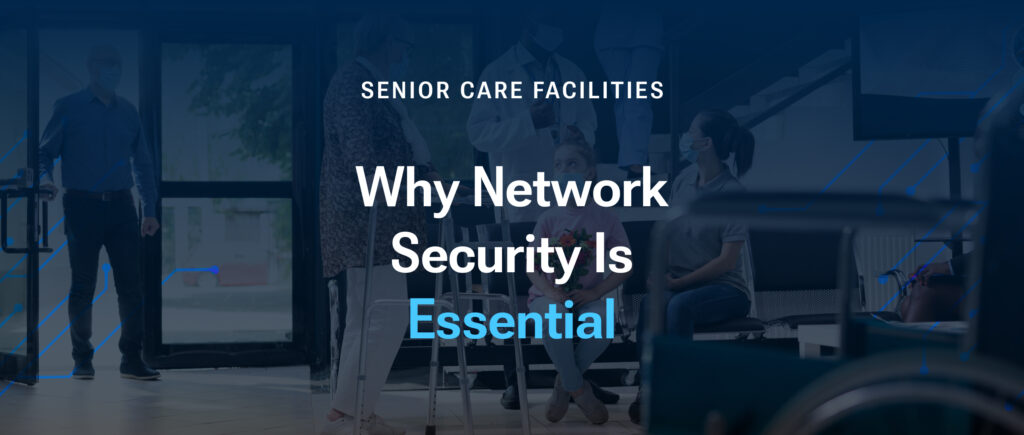In today’s digital age, healthcare organizations like senior care facilities must prioritize protecting sensitive data from ever-growing cyber threats. From patient records to operational systems, senior care facilities handle critical information that must be kept secure. Network security ensures that these facilities are not only compliant with privacy regulations but also shielded from cyberattacks, data breaches, and system failures.
In this blog, we’ll explore the importance of network security for senior care facilities and how implementing a robust security strategy with managed IT services can safeguard data and improve overall efficiency.
1. The Importance of Network Security for Senior Care Facilities
Senior care facilities are responsible for the well-being of their residents, both physically and digitally. These organizations handle vast amounts of sensitive personal and medical data that must remain confidential and secure. Breaches in network security can lead to serious consequences, including the loss of personal health information (PHI), which could result in legal penalties, reputational damage, and even compromised patient care.
The most common risks for senior care facilities include:
- Cyberattacks: Hackers often target healthcare facilities to steal sensitive information, including medical records, personal information, and financial data.
- Ransomware: Malicious software that locks access to critical systems until a ransom is paid can cripple operations and prevent care providers from accessing essential data.
- Human error: Employees may inadvertently expose sensitive data through weak passwords or by falling victim to phishing attacks.
With so much at stake, it’s critical for senior care facilities in Oklahoma City, Bethany, and Midwest City to invest in strong network security systems. At Advance Network Design, we offer comprehensive Network Security solutions to help protect your facility from these threats.
2. Protecting Patient Data with Managed IT Services
Healthcare data is one of the most targeted types of information by cybercriminals. For senior care facilities, protecting patient data is not only a legal obligation but also a moral one. By working with a managed IT service provider, facilities can ensure that their networks are secure, and that the personal information of their residents is protected.
Managed IT services provide several key benefits for senior care facilities, including:
- Proactive network monitoring: Constant surveillance of your network helps detect and mitigate threats before they can cause damage.
- Data encryption: Encrypting sensitive data ensures that even if a breach occurs, unauthorized individuals cannot access it.
- Secure access controls: Managed IT services can implement multi-factor authentication (MFA) and other access control measures to ensure only authorized staff members can access sensitive data.
At Advance Network Design, we specialize in offering Managed IT Services that provide senior care facilities with the tools and support they need to maintain the highest levels of data security.
3. Compliance with Regulations and Industry Standards
Senior care facilities must comply with stringent regulations regarding the handling of personal health information, such as HIPAA (Health Insurance Portability and Accountability Act). These regulations are designed to protect patient data from unauthorized access and breaches. Failing to comply with these regulations can result in hefty fines and damage to your facility’s reputation.
Key regulatory requirements include:
- Data privacy: Facilities must ensure that all patient data is stored, processed, and transmitted securely to prevent unauthorized access.
- Regular audits: Many regulations require facilities to perform regular audits of their network security systems to ensure compliance.
- Disaster recovery plans: Facilities must have disaster recovery plans in place to quickly restore access to patient data in the event of a breach or system failure.
By partnering with a managed IT service provider, senior care facilities can ensure they remain compliant with these regulations. Our team at Advance Network Design offers specialized IT planning services that help facilities develop strategies for long-term compliance and security.
4. Implementing Backup and Disaster Recovery Plans
In addition to safeguarding data from cyber threats, senior care facilities must be prepared for worst-case scenarios such as system failures, natural disasters, or ransomware attacks. Backup data and disaster recovery plans are essential for ensuring that facilities can recover quickly from an IT disaster, minimizing downtime, and ensuring that patient care is not disrupted.
Key elements of a disaster recovery plan include:
- Regular backups: Facilities should perform regular backups of their critical data to ensure it can be restored in case of a breach or system failure.
- Offsite storage: Backing up data to secure offsite locations or the cloud protects it from physical disasters like fires or floods.
- Disaster recovery testing: Facilities should regularly test their recovery plans to ensure they can be executed quickly and effectively.
For senior care facilities in Edmond, Nichols Hills, and Warr Acres, Advance Network Design offers comprehensive Backup Data and Disaster Recovery solutions that safeguard critical data and help ensure continuity of care.
5. Network Security Best Practices for Senior Care Facilities
Effective network security is built on a foundation of best practices designed to prevent unauthorized access and ensure the safety of sensitive data. Senior care facilities should implement the following best practices to protect their networks:
- Regular software updates: Keep all software and systems up to date to ensure vulnerabilities are patched promptly.
- Employee training: Educate staff about phishing attacks, password management, and other common security threats to reduce human error.
- Firewall and antivirus protection: Use advanced firewalls and antivirus software to prevent malware and unauthorized access.
- Multi-factor authentication (MFA): Require MFA for accessing sensitive data and systems to add an extra layer of security.
For facilities in The Village and Woodlawn Park, Advance Network Design provides IT solutions and Network Security services designed to address the specific needs of senior care facilities. These include proactive threat detection, continuous monitoring, and advanced security tools.
Conclusion: Why Network Security is a Must-Have for Senior Care Facilities
In today’s digital landscape, network security is essential for senior care facilities that handle sensitive data and rely on secure IT systems to provide quality care. Protecting patient information, complying with industry regulations, and having a robust disaster recovery plan in place are all critical to the success of your facility.
By partnering with a trusted managed IT service provider like Advance Network Design, senior care facilities can implement comprehensive network security strategies that safeguard both their data and their operations.
Ready to enhance your senior care facility’s network security? Contact Us today to learn more about our customized IT solutions for healthcare organizations.
FAQs: Network Security for Senior Care Facilities
1. Why is network security important for senior care facilities?
Network security protects sensitive patient information, ensures compliance with regulations, and prevents cyberattacks that could disrupt care.
2. How can managed IT services help secure senior care facilities?
Managed IT services provide continuous monitoring, data encryption, and disaster recovery solutions to ensure that senior care facilities remain secure and operational.
3. What are common cybersecurity threats for senior care facilities?
Cyberattacks like ransomware, phishing schemes, and data breaches are common threats that target healthcare organizations due to the value of sensitive personal health information (PHI).
4. How do backup data and disaster recovery plans benefit senior care facilities?
Backup data and disaster recovery plans ensure that senior care facilities can recover quickly from IT disasters, minimizing downtime and protecting patient care.
5. What network security best practices should senior care facilities implement?
Facilities should use multi-factor authentication, regular software updates, employee training, and advanced firewall protection to secure their networks.
6. How can senior care facilities in Oklahoma City improve their network security?
Facilities in Oklahoma City can rely on Advance Network Design’s Managed IT Services to provide proactive security measures and data protection.
7. What IT services are available for senior care facilities in Bethany?
Senior care facilities in Bethany can benefit from network security solutions and backup data services to protect sensitive patient information.
8. How can senior care facilities in Edmond ensure compliance with HIPAA?
Advance Network Design offers IT planning services for Edmond-based senior care facilities to ensure compliance with data protection regulations like HIPAA.
9. How can managed IT services help senior care facilities in Nichols Hills?
Facilities in Nichols Hills can leverage managed IT services for continuous monitoring, security updates, and network management.
10. What cloud services are available for senior care facilities in Warr Acres?
Facilities in Warr Acres can use cloud-based backup solutions to securely store data offsite, ensuring quick recovery in case of disasters.
11. How can senior care facilities in The Village protect against ransomware?
Facilities in The Village can protect against ransomware with proactive network security measures, including data encryption, regular backups, and employee training.
12. How can senior care facilities in Woodlawn Park improve their network infrastructure?
Facilities in Woodlawn Park can improve their network infrastructure through IT planning and managed network services offered by Advance Network Design.

